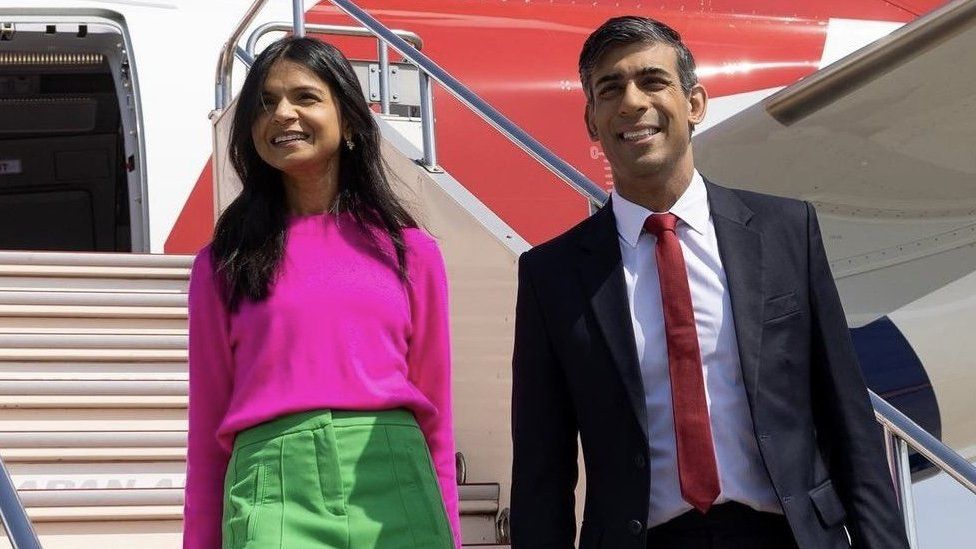ARTICLE AD BOX
 Image source, Getty Images
Image source, Getty Images
UK Prime Minister Rishi Sunak and his wife Akshata Murty arrived in Japan ahead of the G7 summit at the weekend
By Emaan Warraich
BBC News
Akshata Murty, wife of UK Prime Minister Rishi Sunak, has made an eye-catching entrance stepping off the plane on her first foreign political trip.
On Instagram, she described the visit to Japan as "jam packed" but said she "couldn't be prouder" to be a part of the UK's G7 delegation.
Ms Murty has taken a higher profile in public life since her husband became prime minister.
The couple's huge personal wealth - they appear on the Sunday Times' Rich List - has led to some opposition politicians branding the prime minister as "out of touch" and her finances have caused them political headaches.
It was revealed last year that Ms Murty had non-dom tax status, meaning she did not have to pay UK tax on income earned abroad. Ms Murty subsequently said she will pay UK taxes on her overseas income.
While personally wealthy, Ms Murty has chosen a variety of designer and High Street brand clothes for her wardrobe.
And her choices will come under more scrutiny in future, as her trip to Japan and appearance at other high-profile events, including the coronation of King Charles, shows.
Image source, Getty Images
Image caption,US First Lady Jill Biden and Ms Murty walked to a wreath-laying ceremony in Hiroshima's Peace Memorial Park
Image source, Getty Images
Image caption,Ms Murty started a fashion label, named Akshata Designs, in 2009
Image source, PA Media
Image caption,Prime Minister Rishi Sunak and his wife Akshata Murty were welcomed by Japanese Prime Minister Fumio Kishida and First Lady Yuko Kishida
Who is Akshata Murty?
Akshata Murty has spent much of her life in the US and India, where her father founded one of the country's biggest companies.
She studied economics and French in California and then earned a diploma at a fashion college before working at Deloitte and Unilever, and studying for an MBA at Stanford University.
Her relationship with Mr Sunak began at the university's campus near San Francisco.
In 2009, they married in a ceremony in the bride's home city of Bangalore, later hosting a wedding party in New York.
In the years after graduation, they lived in Santa Monica, California, where they still own a penthouse apartment. For two years, she worked for venture capital company Tendris, but quit in 2009 to start a fashion label, named Akshata Designs.
It was the culmination of a life-long love of fashion, which had baffled her "no-nonsense engineer" mother, Ms Murty told Vogue India in 2011. The company's website said it aimed to provide a "sustainable source of income" for female artists and craftspeople in rural India.
Image source, Getty Images
Image caption,At the coronation, Ms Murty wore a dress by designer Claire Mischevsni to the coronation of King Charles and Queen Camilla
Image source, Getty Images
Image caption,Jill Biden joined the PM's wife during a lunch at Downing Street to celebrate the Coronation
Image source, Reuters
Image caption,Ms Murty joined her husband on a trip to promote a government's family hub policy earlier this year
Image source, Getty Images
Image caption,The prime minister and Ms Murty look on as the Christmas tree lights are turned on outside 10 Downing Street

 1 year ago
17
1 year ago
17








 English (US)
English (US)